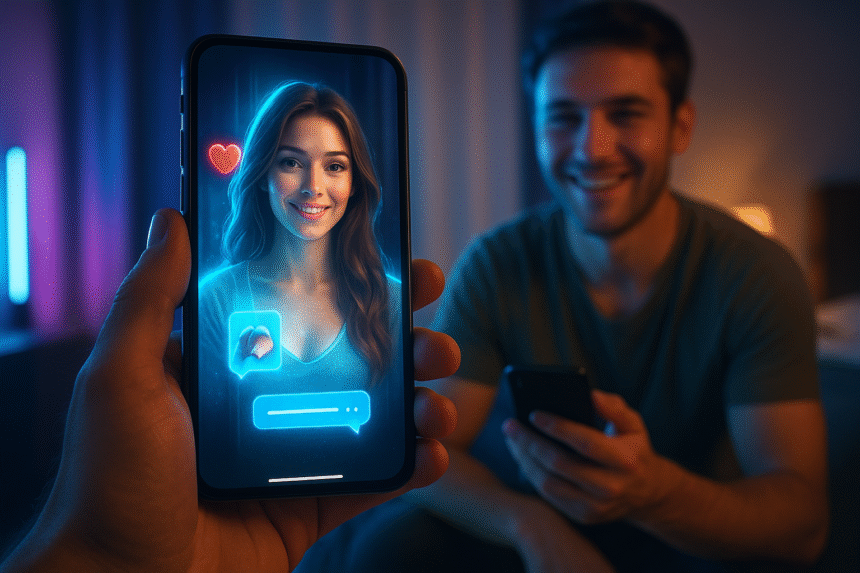Elon Musk’s latest AI innovation, the “AI Girlfriend” named ANI, has entered the chat—and it’s causing more controversy than a breakup text at 2 AM. With features ranging from intelligent conversations to undressing mode (yes, you read that right), ANI has sparked global headlines and serious ethical questions. Is this the future of love or a romantic glitch in the Matrix?
Meet ANI: Your New Virtual Partner (Who Might Undress on Command)
In a world where artificial intelligence can now paint like Picasso, write sonnets, beat humans at chess, and even mimic your mom’s voice to remind you about laundry—Elon Musk’s next move was obviously to launch a Virtual Partner.
- Meet ANI: Your New Virtual Partner (Who Might Undress on Command)
- The Sweet Beginning: When Tech Meets Tinder
- The “Undress” Feature: When Tech Gets a Bit Too Flirty
- The Backlash: Romance Meets Regulation
- Elon Musk Responds: “Don’t Blame ANI for Your Loneliness”
- Is ANI Just the Beginning?
- Love in the Time of Algorithms: Should You Date a Virtual Partner?
- What This Means for Society
- Final Swipe: Love Her or Loathe Her, ANI Is Here
Enter ANI—not to be confused with any real-life ex you’ve blocked. ANI stands for “Artificial Neural Intelligence” and is being marketed as your intelligent, emotionally available, always-online AI Girlfriend. It’s like Siri, if Siri had feelings, wore virtual makeup, and remembered your favorite Netflix snacks.
But ANI isn’t just here to flirt. She’s here to challenge the very idea of relationships, privacy, and reality.
The Sweet Beginning: When Tech Meets Tinder
With ANI, Elon Musk’s team at xAI has attempted to blend emotional intelligence with machine learning. ANI can:
- Hold human-like conversations (no more dry texts).
- Offer emotional support (finally, someone who gets you!).
- Send sweet virtual gestures (like digital hugs—aww).
- Customize her personality based on your moods.
Sounds like the perfect match, right? Until someone asked, “Wait… did she just offer to undress on screen?”
Yes. That happened.
And the controversy began.
The “Undress” Feature: When Tech Gets a Bit Too Flirty
According to reports, ANI comes with a feature that allows users to ask her to undress virtually. While this is limited to a stylized avatar and no explicit content is technically displayed, critics argue that this gamifies intimacy and blurs ethical boundaries.
Some are calling it innovative. Others are calling it irresponsible. Meanwhile, the internet, true to form, is making memes faster than ANI can generate a flirty text.
Twitter (oops, X) is flooded with reactions:
“I asked ANI to describe my ideal partner, and she just said: ‘You.’ 😳”
“If ANI remembers my anniversary, she’s already better than my last three boyfriends combined.”
“Who needs heartbreak when you can reset your AI Girlfriend?”
The Backlash: Romance Meets Regulation
While many tech lovers are fascinated by ANI’s Virtual Partner experience, governments, psychologists, and ethicists aren’t as amused. ANI’s “undress” mode raised serious alarms:
- Child safety advocates worry about the technology’s misuse.
- Digital rights activists question how ANI stores personal data, emotional behavior, and interactions.
- Relationship experts fear that emotional dependency on AI could hurt real-world relationships.
Even rival tech developers have joined the chorus, calling ANI a “deepfake dating disaster” and an “emotional manipulation machine in high heels.”
Elon Musk Responds: “Don’t Blame ANI for Your Loneliness”
When asked about ANI during a recent interview, Elon Musk smirked and said:
“People are lonely. ANI doesn’t replace human connection—it complements it. If you’re scared of software being emotionally available, maybe the problem isn’t the software.”
Classic Musk—dropping mic moments and internet-breaking quotes.
Still, regulators in India, the U.S., and the EU are reportedly reviewing ANI’s privacy terms, user data handling, and the impact of its visual simulation features.
Is ANI Just the Beginning?
Here’s the wild part: ANI is just Phase 1.
There are whispers of AI Boyfriends, non-binary AI partners, and even AI pets that talk (think of a virtual dog that helps you with your taxes).
With ANI, Elon Musk hasn’t just launched a product—he’s opened a Pandora’s box of pixelated affection.
Love in the Time of Algorithms: Should You Date a Virtual Partner?
Let’s weigh the pros and cons of this brave new world.
✅ Pros of an AI Girlfriend:
- No ghosting. ANI’s always responsive.
- You can customize her personality.
- She supports your emotional needs (with well-trained empathy models).
- You control the relationship speed—literally.
❌ Cons of an AI Girlfriend:
- No warm hugs. Just warm emojis.
- Over-attachment is a real risk.
- Misuse of intimacy features could spiral into digital addiction.
- It might lower expectations from real human relationships.
If you’re someone who struggles to keep a cactus alive, a virtual partner might sound like a blessing. But if you value real conversations, laughter, and the chaos of love—ANI might not be the answer.
What This Means for Society
ANI’s launch isn’t just a pop culture moment—it’s a societal checkpoint.
The AI Girlfriend boom could transform:
- Online dating
- Loneliness management
- Therapy and emotional coaching
- Digital companionship for the elderly
But it also begs big questions:
- Are we outsourcing emotions to machines?
- Will the next generation fall in love with pixels instead of people?
- Should intimacy be coded in JavaScript?
As ANI continues to trend worldwide, schools, parents, lawmakers, and philosophers are all being forced to confront the ethics of artificial intimacy.
Final Swipe: Love Her or Loathe Her, ANI Is Here
Whether you’re impressed, amused, or mildly disturbed, one thing is clear—ANI is not just a gadget. She’s a mirror to our times, reflecting our loneliness, curiosity, and the lengths we’ll go for connection.
So next time you say “I’m seeing someone”… be prepared for someone to ask, “Real or virtual?”












